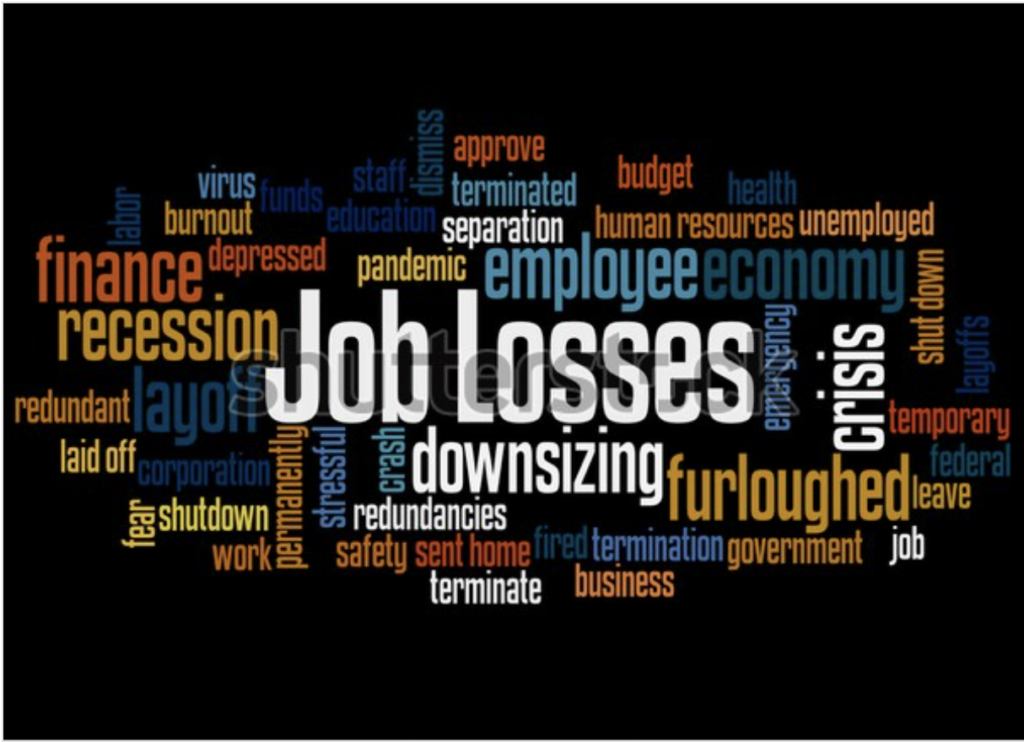
Introduction
I am going to be honest: when I was “terminated” from my job, it sucked. Even though I knew my employer was feeling the strain of the coronavirus pandemic, I did not see my job loss coming, so it hit me as a double whammy-both as a shock and a loss. I had never been fired from any job before. Thoughts began to permeate my mind: where do I even start picking up the pieces, when my whole sense of security and identity feel like they have been knocked out at once? I was a bit overwhelmed at all the emotions which surfaced, ranging from a sense of humiliation, failure and vulnerability, to anxiety, resentment and self-pity. Although it was a blow to my financial plans, it was an even bigger blow to my ego and self-worth.
I was able to keep my wits about me and realize that my success in life was in the end measured not by the tragedy itself, but by how I responded to the setback. I came to understand there were two sides to the challenge I now faced, the emotional and the logistical. I hope that these tips on how to cope may be of benefit to others in a similar situation.
Emotional/Mental Coping Tips for Job Loss
Let yourself mourn your job loss
It is hard to get traction in your job search until you spend some time sorting through your feelings about what just happened. Give yourself permission to process your emotions and to mourn the loss of your job. When you tried to repress or ignore your emotions, it may seem like it helps you cope, but you’re actually setting yourself up for tougher times as you navigate your job loss and everything that comes with it. If you feel the need, and can afford to do it, give yourself a break for a few days or a week or two.
Practice Gratitude, Extend Kindness
There are loads of scientific studies that prove that the practices of gratitude and extending kindness toward others can have a huge boost on our mental health and well-being. It can help us reframe our outlook, preventing us from getting sucked into depression or loss of motivation. These thoughts and actions can remind us that there is plenty to be thankful for that we weren’t thinking about, and that things are going to be okay.
Do Not Let Your Job Status Define You
Although losing your job is a very personal experience, you should not take it too personally. Who you are is not what you do. Research has shown that the biggest determinant of success after setbacks of any kind is how an individual interprets that. Those who interpret losing their job as a sign of personal inadequacy or failure are much less likely to jump back into the job hunt than those who interpreted it as an unfortunate circumstance that provided a valuable opportunity to grow in self-awareness, re-evaluate priorities and build resilience. You define who you are, not your job or a company’s decision whether to employ you. Do not take it as a personal rejection, for like me, it may well be due to economic forces far beyond your control that you found yourself out of work. Individuals who have proven their ability to stay positive and confident despite a setback/job loss will be much more attractive to future potential employers.
Focus On Self-Care
After an emotional trauma like this, it is tempting to wallow in self-pity. But emotional and mental resilience requires physical resilience, and the latter can be best maintained by starting or continuing to remain active. So I cannot emphasize enough about the importance of some regular form of exercise. It will help to dissipate stress and help you with keeping a positive self-image if you are strong and fit. You cannot use the excuse you do not have enough time to exercise!
Create a Job Search Routine
One prominent difficulty of a sudden job loss is how immediately it transforms your daily routine. It is definitely hard to go from the rigors of full-time employment to having all sorts of free time on your hands. When this happened to me, I felt as though every day was a Saturday. It’s important to build a routine around your work as a job seeker, as creating structure helps both psychologically and logistically. Formulate a job search plan with goals and small manageable steps. Then prioritize, structure your day and treat finding a job as a job.
Logistical Tips for Job Loss
Now the pragmatic aspects of your situation come into play. Here’s how to get back on your feet when the unexpected happens:
Check Out Unemployment or Retirement Aid
The first thing to do when you lose your job is to find out if you are eligible for government unemployment benefits. Your financial survival depends on a regular source of income. In the US, individual states determine eligibility. Since I was already beyond retirement age, I was fortunate to be able to tap into Social Security benefits.
If You Have It, Embrace Your Emergency Savings
If you have been insightful enough to have stashed away some money in a rainy day or emergency fund, now is the time to use it. Your “Rainy Day” has arrived! This money can buy some time until you get your legs underneath you, but it makes sense to direct this for the bare essentials until other cash flow becomes available.
Rework Your Budget
Even if you are eligible for unemployment benefits, it’s a good bet you will be cutting back due to the job loss. Devise a budget that allows you to cut down on expenses as much as you can. Avail yourself of any one of several free budgeting tools/apps to assist in analyzing how your spending habits are affecting your financial standing.
Health Insurance
If your former employer provided subsidized health insurance as part of your benefits package, you are now going to have to figure out how to get some continued coverage on your own. COBRA provides a period of continued group coverage through your former employer. Check with the HR department there for more information on the terms and cost, but keep in mind this is a temporary arrangement.
Tap Into Your Network
Reach out to past colleagues and other acquaintances and enlist their support in making any introductions or connections that could help you. Never underestimate the power of your contacts/network to open up opportunities and land you that “lucky break” you were hoping for.
Keep Busy
Land some freelance jobs, take part in online business conferences or events, or seek part-time or pro bono work so you are not concerned about questions your future employer might ask about how you used your employment gap time.
Update Your Infrastructural Pieces
Refine your LinkedIn profile, resume, and cover letter (current, accurate and clearly written), because they will be providing you with the support you need to find a new job. There are innumerable online resources for do-it-yourselfers, but you might consider hiring a resume writer or career coach for this important task.
Also, most companies are likely to go through your social media profiles before inviting you for an interview, so review these profiles to make sure everything is in order, welcoming and consistent.
Reevaluate Career Choice
Losing your job provides the ideal opportunity to reassess your career choice and determine whether a change is in order. Did you enjoy what you were doing? What is your worth in the market, and what is the health of that market? If you wish to remain in the same line of work, are you in need of updating some skills or keeping up with trends in your industry? If there aren’t a lot of openings for what you currently do, you may need to learn new skills or transition into an entirely new career altogether.
Apply For A New Job
When exploring job opportunities, keep an open mind as to potential resources. If networking does not provide any meaningful leads, browse business websites, social networks, recruitment pages, job sites, local newspapers and business publications. You may be surprised as to what platform or channel will become the source of your new job.
Starting Your Own Business After Job Loss
Losing your job might be a blessing in disguise. You might realize it is time to write a new chapter in your life and start earning a living by starting your own business. This is the direction I chose to take. If you are interested in further details of my story, I encourage you to head to the About section of my site. To get started along this career path, you should take the following initial steps:
Choose a business model
When selecting a business, one important factor to consider is start-up costs. Will you need office/sales space, office equipment, computers, product to sell, access to ancillary services such as shipping, employees? One suggestion I have is to consider an online or digital business, as you basically need only a computer and online access, so the start-up costs are very low.
With an online business, you can work from home, set your own hours, and do not need proximity to your customers in order to supply products and services to them. As a shameless plug, I received training from Entre Institute, which offers training in three principal online business models, and I am involved in sales of online educational products and other affiliate marketing. Numerous other online business options are available, most which involve low costs. In addition, you can hire resources cheaply by way of international outsourcing when you cannot manage issues by yourself.
Funding
Your initial business funding can consist of starting with your personal money. This might come from savings, or you can get creative. Some might have garage sales to mobilize funds, others might consider pre-selling their services and getting upfront money from family and/or friends. Some people might find a source of money by renting items in and around their home-you can even rent space in and outside the house! At a later time, you can expand funding by applying for a business loan.
Employees
Even if your new business starts as a solo undertaking, there may be a time when the business grows sufficiently for you to require help. Hiring a virtual assistant (VA) can take a load off your plate, and you can make this a short or long term arrangement as your needs dictate. If you plan on hiring a long term VA, you may want to consider an agency that provides these services, to insure against unforeseen interruption in your help.
Conclusion Regarding Job Loss
There is no way around it, as I can attest: losing your job is a huge kick in the gut. But there are potential opportunities to emerge from this horrendous experience in a better place than you started. You may well find a job or start a business that you are more passionate and happy about than your former occupation. One day you may look back on this time with some measure of gratitude for what you gained from it, whether it was a chance to re-evaluate your life, spend extra time with your family, teach your children about how to deal with a crisis, or simply reaffirm what matters most. I am most grateful I am gifted with extra time to care for my ailing nonagenarian father, and to spend more time with my wife.
I am confident you will get through this. Try to keep your head high and your vision forward looking.
If you are interested in learning how to be an online work-from-home entrepreneur or to just earn some extra side income, please consider checking out the Entre Institute, a high quality educational program.
